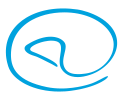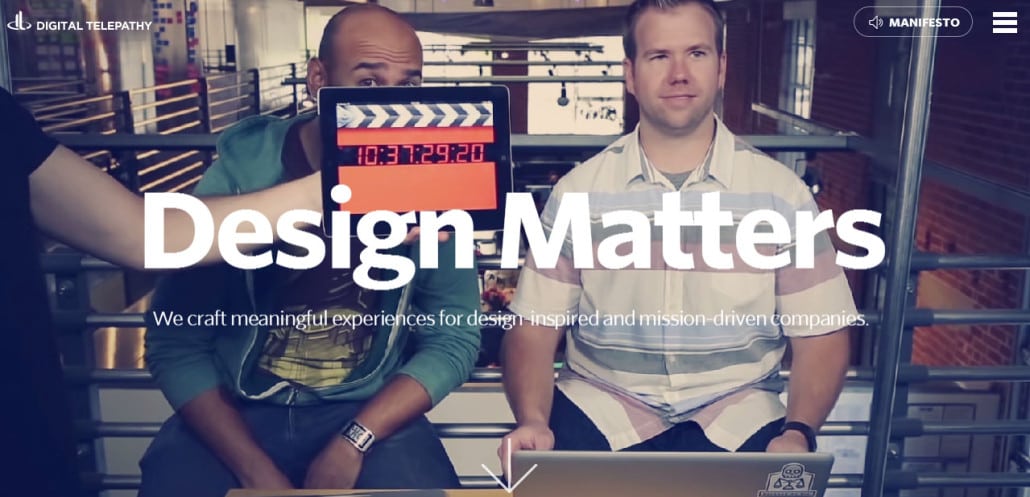I found myself standing in front of an eager group of students and mentors, none of which I had ever met before. Let the hacking begin…
Posts
Learn how to install and configuring a custom theme, install plugins, build pages, create menus, and make your first blog post.
The first annual WP Campus was focused on WordPress in higher education, but also showed off the power of digital communities, and the growth of the WordPress platform as a whole.
Hello internet.
I wanted to share this story with you because something I saw on the web today really got under my skin and I thought it was something you should know about. Especially if you are looking for credible WordPress developers in the Sarasota market.
I recently googled Sarasota WordPress to see what would show up, and wouldn’t you know it, one of the top results was a small web development agency who was touting their awesome WordPress skills.
I’d tell you their name and link to their website, but as I explored their portfolio I found out that they were passing my work off as their own and I am not ok with sending my audience to people who feel comfortable stealing online.
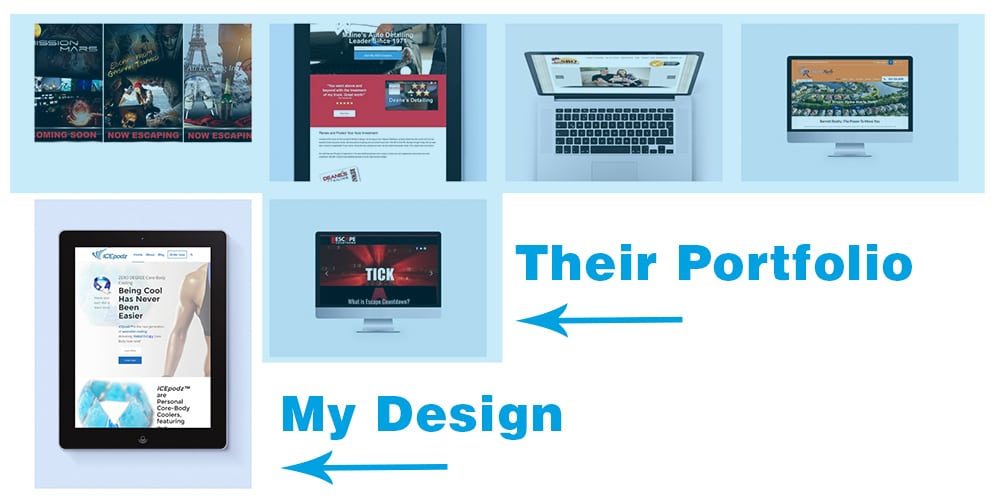
Their portfolio with my work in it
You see, as one of the organizers of the local WordPress Meetup group, I love meeting other WordPress users. I love interacting with the WordPress community as a whole and learning more about the people and businesses who use this powerful content management system to manage their online operations.
Related: Learn more about WordPress
WordPress has changed my life so I am passionate about sharing that online toolbox with others. I also regularly give of my time and resources to the WordPress community. That being said, it is also something I do for a living, which is why I felt the need to share this post with all of you.
Because if we want people to respect us as digital entrepreneurs, we must start respecting ourselves and the work we put into our projects. And we cannot be ok with others passing that work off as their own. In any regard.
I was even more let down to see that the new web developer was not only taking credit for my work, but they were also shit talking the previous “web firm” aka – Me.
An excerpt from the new web developers website.
But that was not the case. What we have here is a client that does not understand the value of what they got and a web developer who apparently has no clue about how it all went down.
But then I thought to myself- Self, let’s not jump to conclusions.
I thought, maybe the new developer had gone in and made some major modifications, maybe they made some serious improvements and took the website to the next level, so I went and explored the site.
NOPE…
What I found was a website which was almost identical to what I had delivered… Which is when I really started boiling.
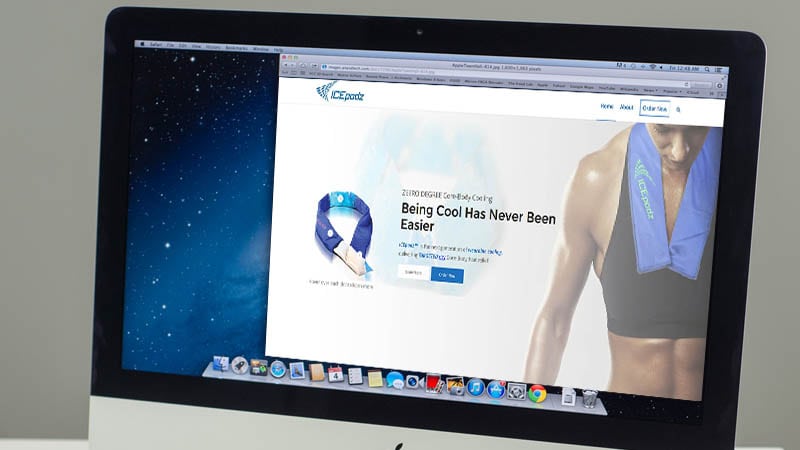
A screenshot of the website I designed for IcePodz back in 2014.
Actually, here is the case study I wrote about the project itself back in 2014 – And here is a link to the wayback machine with a record of that article going back to 2014.
It shows the work I put into the website and includes a detailed explanation along with images that describe how I optimized the design of the website, improved the page layouts and simplified the ordering process.
As I explored the “new” website vs what I delivered, I saw no major changes or updates to the design, layout, navigation, etc. However, the developers website claims graphic design, responsive web design, ecommerce, etc. as services provided.
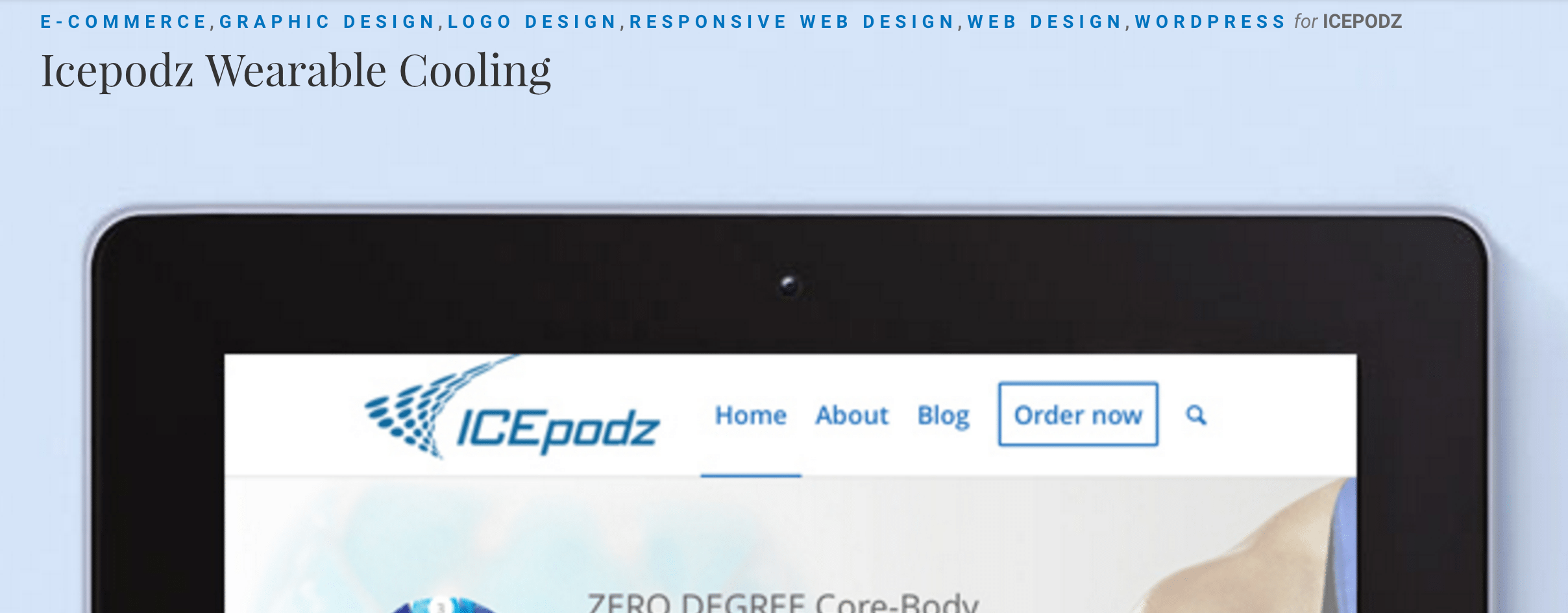
At the top of this image you can see the services they are claiming on this web project.
In actuality, the only thing that has been added to the website was a blog, and a page about their new product which is just a picture of a flyer, not an actual page on the website. Not to mention that the articles on the blog don’t have any content in them. They are empty articles, inside a barebones blog, on a content management system that was built for blogging. Which leaves me wondering…
What the heck did the developer do to feel like they deserved to throw this website in their portfolio as a project they produced?
And while I do not typically put my pricing information on blast, in this instance I feel it is necessary in order to clear the air about why this stuff really bothers me.
You see, I built the original IcePodz website for $1,500 dollars. In 5 days.
I was at a point in my career where I need to grow my portfolio, and was willing to work for a fraction of what I was worth because I was trying to build my consulting practice and wanted to add a company that I thought had a cool product to my portfolio. Silly me to think a client could ever understand the value of what they were getting when I was giving it away so cheap.
I spent countless hours working with the client, invited them into my house and even tried to train them on how to use WordPress. We even recorded an hour long screencast showing them how to navigate their new website. I showed them how to add content and took the time to explain the why behind what we were doing. I put real effort and hard work to build them that website and to have someone else claim it as their own, or dismiss my efforts in order to make themselves look better is disingenuous at best.
I gave the client the best work I could inside of their budget and time constraints, and any objective observer would see that I delivered a website that was beautiful and dynamic and delivered on everything that I promised the client.
Obviously the site was nice enough for this guy to think it belonged in his portfolio. But no part of this is acceptable in my book, and I felt I needed to say something about it.
It is our responsibility as web professionals to build value in each other’s work, not diminish it. We should be looking for ways to bring more credibility to our industry, not steal from it or those who are bringing that value.
So to the asshole who is claiming credit for my work…
I see you. And you have been warned. I sent you a personal message yesterday, and now I am calling you out publicly.
Either credit me with the design, or better yet, take the site off of your portfolio entirely. Because I looked at the rest of your work, and it is clearly above your skill set. You are deceiving potential clients, misrepresenting your abilities, and outright lying to anyone who visits your website.
You would also do well to remember that Sarasota is a very small city and most of us in the local tech world know each other. Just ask yourself if any of this is worth the impact it might have on your reputation as a web developer. Locally, and online as a whole.
Anyway, rant over. You have officially taken up too much of my time.
Goodbye internet. Until next time.
Anyway, what do you think? How would you have handled this situation? What would you do if this was you? Has this ever happened to you? Share your thoughts in the comments below.
In this months episode of WordPress Wednesday we discuss the main differences between two of the most popular content management systems.
In this episode we interview Pete Petersen, the CEO of Dealers United, and dive deep into the details of how they use WordPress to manage their multi-million dollar web based business.
A short video that explores the idea that in the near future, we may no longer have to teach our children how to drive.
WordPress Wednesday is sponsored by zoing.ly
Last week I interviewed Mason James, the founder of Valet.io (formerly WordPress Valet) as part of our WordPress Wednesday Interview Series.
The interview explores his personal WordPress journey, and is filled with insights on how to run a successful WordPress based business.
Valet.io works with brands like Etsy, TimeInc, Nvidia, Harvard University, Mixergy, and more, and is well respected in the WordPress community for top tier development and support services.
If you are looking to start a WordPress business, or want to learn more about how to grow and scale your WordPress business then this might be a good place to start.
If you are in Sarasota, you can attend these MeetUps in person. Learn more on our MeetUp page.
Show Notes
1:45 – Starting out as a freelancer
We start out by talking about the path from freelancer to entrepreneur.
4:15 – Picking WordPress as a platform
I asked Mason how he decided to pick WordPress as the platform for him to build his online business.
6:10 – Getting involved in the WordPress community
Mason and I dive into the importance of the WordPress community, and talk about how people can get involved in the WordPress community, and why it is such a large part of WordPress success.
13:30 – Breaking the freelancer gap
I asked Mason how he made the jump from freelancer to full fledge business owner. We dive into how he landed his first clients, how he hired his first employees and more.
15:30 – Getting your first customer
We dive deeper into prospecting, networking and getting started as a small business owner.
17:25 – Biting off more than you can chew
Sometimes you have to get a little ambitious when you are trying to build your own business, but that can definitely backfire on you in the online world. Get advice on staying within your core competencies, and how to learn as you grow.
20:18 – To pick a niche or not
Some people swear by the idea that you have to specialize in order to be successful, so I wanted to know what Mason thought about being a generalist, or picking a specific niche.
20:54 – The main goal of any website
If there is one part of this interview which you should listen to, it is this section. In it Mason goes over his process for assessing websites, and outlines the order in which they approach website optimization.
24:29 – I hire people to do the things I suck at
Mason explains how he hires employees, and more specifically, how he hired his first employee. He also dives into his philosophy on how he hires people, and how he vets candidates.
28:48 – Internet freeing people to become their own boss
Mason and I discuss the power of the internet, and how it is empowering more people than ever to go out and become their own boss.
30:07 – You have to fail a lot
It wouldn’t be a proper interview if we didn’t spend some time talking about failure. Listen as Mason explains why failure is such an important part of starting and running a successful business.
34:49 – Creative processes deserve their own brain cycles
Towards the end of the interview, we dive into the creative side of running the business, and talk about the importance of spending time creating quality content, and connecting with a social audience in order to grow your online business.
44:55 – Quantifying the value and getting the money
We end the show by talking about how to stand up for what you are worth, how to set your rates, and discuss how to make sure people understand the value you are providing.
Skip to the 11:29 mark to start the meeting, and to the 20 min mark to skip the introductions.
This was our first live broadcast of WordPress Wednesday, and things will get more efficient and on point as we move forward with this show concept. Thanks for all who showed up and participated in the live audience.
We will start the conversation with a compelling story about how WordPress has helped me reinvent my career, and then open the discussion up to the audience in order to get stories and feedback from others about how WordPress has had an impact on their lives.
Learn more about WordPress Wednesday
If you are in Sarasota, join our MeetUp Group
Update 12/9/2015
I have been following the team over at Digital Telepathy for a couple years now, so when they asked me to write a post for them about their public launch of Filament, I couldn’t resist.
Our relationship started with the podcast in this post, but evolved in to so much more over time. Since then I have developed a great working relationship with their products team, and was even a part of the Alpha and Beta teams who gave feedback to help them refine Filament’s functionality and performance.
A few months ago, I wrote this article for the DT Blog, and recently, we have even been talking to their COO for strategic direction on a new venture my team has been working on for the last few months.
Needless to say, I’m a big fan of this company and their work over the last few years, and it has been a pleasure to be a part of the Filament launch up to this point.
So with no further delay, here is everything you need to know about the team over at DT, their company philosophy, and a little inside skinny on the launch of their new product.
Originally published June 5, 2014
Understanding the philosophy of the San Diego start-up behind Filament.io – Digital Telepathy – Rated R for Raymmar –
In this episode of RayDO…
I interview Jason Amunwa (Director of Products) and Shawn Leslie (Product Designer) from Digital Telepathy.
Disclaimer: This is not a paid advertisement and I received no compensation for conducting this interview.
I simply bumped into these guys online while trying their online apps and then reached out about doing an interview.
I have written other popular articles about other useful productivity software and this is just another in that same style. It was simply a way for me to test my podcast skills and tell a fun story about a cool company.
Part of my goal on Raymmar.com is to inspire people to create better products and I believe in their motto of “Design Matters.”
This is the first of two podcasts that I will publish. Both from the same interview with DT, but I wanted to talk about their philosophy in this one and in the next one we will get a little more technical about the product and how it can help your website.
Subscribe to be sure you don’t miss it. And make sure to grab us on Stitcher so you can listen to us while you work-hard, or hardly-work.
Podcast Transcript and Summary
Look, I know this is not a perfect transcript.
Some of this was available because I scripted parts of the narration and others because I wanted to summarize the content for search engines.
However, I highly encourage you to listen to the podcast itself as it is entertaining and educational.
Plus only weird people read transcripts. Just saying.
Go download the Stitcher app so that you can take RayDO on the run. It has a robust mobile experience, allows you to save your place in the episodes and that way you can always have our newest shows right on your phone.
A few weeks ago Jason Amunwa who is the director of products at Digital Telepathy, along with product designer, Shawn Leslie, joined me via Skype for a short interview.
They asked me to hold the interview until after their big launch but that has happened so, here we are. One of my goals is to to keep my audience on the cutting edge of all things digital so in this episode I am going to introduce you to a company that is leading the way with some of their own online software.
Digital Telepathy has worked with companies like New Relic, Apple, and Google so these guys are the real deal.
I wanted to talk to them about their philosophy of “Design Matters” and why they are so adamant about trying to creating a better web for everyone.
But wait just one minute. Before we get too far into this thing, let’s go ahead get this shit started.
Intro music
Cut 1 – Thanks and cool intro music.
For those who don’t know, Digital Telepathy is a company that develops software and web applications and they have just released a new product called Filament, which acts like an app store for your website but we’ll get into that a little later.
Cut 2 – about being under the radar with Filament and not pushing it out because they want to get it right.
So tell me about Digital Telepathy
Cut 3 – Basically we are just a bunch of people who are passionate about the web and are trying to make the web a better place for everybody. We want people to be able to do more with the web.
So this brings up a good point, and a trend in online businesses, where we are seeing companies fill a very specific niche.
I do not think we will see many more monster companies like Microsoft, IBM or Google, but what I think you will see are very specialized companies that do one thing really well. They do that one thing awesome.
Instead of dictating what the person needs to be doing, where they need to be doing it and how exactly they do it, they just give the person a task and base their performance on the results of their work, as opposed the time it took to create it.
These companies are embracing a concept that is based on paying people for the value they bring as opposed to the time they spend “working” and that is allowing them to do truly amazing things.
We talk about the Results Only Work Environment regularly, on this podcast as well as Raymmar.com so I wanted to ask these guys what they thought about the Results Only Work Environment as a whole philosophy and how it fits into their overall culture as a business.
Cut 4 – Betterment – It stacks upon itself and continually helps you grow.
DT takes their culture one step further with a betterment blog and a philosophy that empowers their individual employees to constantly strive to get better.
They also integrate their marketing strategy by allowing all of their employees to help tell the story of their company.
They allow the personality that makes up their company (their employees), to shine through, as opposed to restricting that function strictly to the marketing department, much like other companies do. Something Jason refers to as “Silo Thinking”
Cut 5 – Silo thinking – Lessons we learn and why we share them.
Another one of DT’s driving principles is that “design matters” and since I am a design school drop out, I wanted to get to the bottom of why design is such a big part of their company culture.
Up until this point we have been talking to Jason, the Director of Products at Digital Telepathy but he thought Shawn might have a better perspective on this question.
Cut 6 – Design Matters – Why design matters – Shawn It is more about design thinking and you can apply that to pretty much any problem in the world.
“We find ways to bring design into almost every component of our projects as well as our apps like Filament.” – @shawntleslie
"We find ways to bring design into almost every component of our projects as well as our apps like Filament." – @shawntleslie
— Raymmar Tirado (@RayTirado) June 5, 2014
This answer struck a chord for me as it touched on something that is near and dear to my core philosophy.
The thought that creative thinkers and that “design thinking” to solve any problem is going to be a highly sought after skill. If you listen to my podcasts on a regular basis then you know that I talk a lot about the creative entrepreneur taking over the world.
I talk about the value of applying creative problem solving skills to every day situations and the power in being in touch with your inner content monster.
Cut 7 – Raymmar Analyzing everything. Looking at the big picture, being able to analyze the entire process step by step.
After my little mini rant our conversation took a little bit of a turn towards business strategy as we started to talk about a few of the other apps they have planned for the future.
Since most of their apps are free… I kind of wanted to know how they made money. So I asked.
Jason explained that they work off of a Freemium model which means some of their software is free but you can upgrade for more functionality and to get rid of the sponsored branding that appears on the free versions of the software.
Cut 8 – Freemium – Go with “try-it-before-you-buy-it,” because we want you to be happy with the product you are about to pay for.
This brings up a good point.
The internet is the last free market and it really is changing the way people do business.
Because information is so prolific, it becomes more important for companies to bond with their customers and it also becomes infinitely more difficult for any of them to take advantage of the consumer. Considering I am in start-up mode, I decided to ask them for some free consulting. I wanted to know what they would do as a first step to building a digital product online.
Cut 9 – Tear it down to its smallest pieces. Play to your strengths and make it immediately obvious how you are different than your competition.
So let me clarify the point he just made. He said you need to be immediately different.
You need to understand what and why your model is different from the rest of the competition. Something we talk about regularly on RayDO.
I wanted to take my free consulting one step further so I asked them about their philosophy behind building and testing the apps. I wanted to know how they approached the ongoing development of a digital product and how much of it should be left up to the consumer. I wanted to know if it was too simplistic a request to just find a core segment of users and then let them tell you what kind of product they wanted you to build.
Cut 10 – Objective Based Design – We keep the conversation going with the client and the user. Test and iterate.
His answer was pretty reassuring because this is how I’ve been building my website. It is a work in progress and it will not be done until it is done. And even then, I’m not sure it will ever be done.
I knew the guys weren’t going to let me get my free consulting on all day so I asked them what was the next step for Digital Telepathy and about their new Filament product.
Clip 11 – What is Filament? Filament is like an app store for your website. We wanted to create this app store so that it was easy for people to find high quality apps that work with their site and then make it easy to install it.
So… that’s pretty awesome. I think. But aren’t there other apps out there or products that do this already? How does Filament stand out from the competition.
Cut 12 – WordPress Plug-ins. When they upgrade they can brake your site so Filament eliminates that by allowing you to manage the apps in real time.
I see. So can any developer begin to develop applications on the Filament platform?
Cut 13 – Not Yet – Right now we are focusing on making sure that we have the installation process down. Right now we are creating our own apps for the platform. Once we are confident that we have solved those problems then we will be looking to bring other people on board.
Jason continued to tell me about some plans for future software and other benefits of the Filament platform but for me the most important part of their products is the ability to integrate new features on my website without spending a ton of money in development.
Cut 14 – Making the web a better place – Hiring people is expensive and learning is time consuming. We just want to make it easier for everyone to do these things because we just enjoy it when the web is better.
So what website should people go to in order to learn more about Filament.
Cut 15 – Fliament.io – Check it out, download the apps and learn more about creating a better web.
What an awesome way to look at building a product and I think more companies would do well to take this type of approach to building their digital products. Make sure you subscribe to Raymmar.com and grab us on Stitcher so you don’t miss an episode of RayDO And be sure to go check over at Fliament.io – But for right now, we got to go!
Want more perspective on Filament? Here is an article from the Pando website that goes into more detail about the Filament App Store
In this episode of RayDO uncensored…
Jeremiah Smith and I talk about sales, inbound marketing, buyer personas and the evolution of sales and technology into a power that could be misinterpreted as godly.
Be sure to connect with Jeremiah online at SimpleTiger.com.
Introduction and understanding the sales process
Why everything in life is a sales. We talk a little about my sales philosophy and how sales and life are all about relationships and therefore life equals sales. It is the foundation for everything I do and the premise for my first book.
Resources (links) for some of the books, products etc that we mention in the podcast.
- Never Eat Alone – A book by Keith Ferrazzi
- Square Space – Simple to use web building solutions
- Freshbooks – Cloud based accounting software
- 22 Immutable Laws of Marketing – A book by Al Ries and Jack Trout
- Money Masters Documentary – A documentary about the concept of money
- History of Social Media & Future of Politics – Our recent podcast about social media and politics
- Debate.org – An online debate platform
Focusing in on the right ideas – 6:30
Bouncing around ideas for how to explore business growth. Finding what it is you do and why you do it. Learning how to simplify your message and finding what it is you are actually doing with the business. Focusing on listening and letting your customers guide your business strategies.
Leveraging relationships – 9:48
Understanding long and short term relationships, becoming an artist and finding your way.
Showing us that there are humans inside of your product or company? 13:00
Why larger companies should change their online philosophy, question their advertising strategies and focus on telling better stories.
Are corporations the evil villains? 16:25
Corporations, government and people. What is the difference and why do they suck? Does it really just come down to people making decisions? how much does a CEO or president affect the outcome of the whole?
Killing corporations with a thousand paper cuts – 18:22
How small companies are taking on the giants with small, hyper-focused products and solutions.
Instant gratification. Shopping online or in person – 23:38
Why I regularly pay more to buy things in person instead of online. Do real life interactions and personal relationships make a difference in the sales process? Competing with the big box stores.
A sleeper superpower – 26:30
General Electric and their connections to media, war and the strategies associated with it. Controlling the war debt, checking the IRS and auditing the Federal reserve. We talk Bitcoin conversation and the recent IRS ruling might affect it as well as the impact it might have on society as a whole.
The Bitcoin peer-to-peer supercomputer – 31:01
Understanding how big the Bitcoin network actually is. The computing power behind it and the implications of digital currencies and whether or not they can actually stop the process of information overflow.
Taking over the world – 34:14
Surrounding yourself with knowledge and striving to know more. Become a resource for your friends and the world, explore both sides of the issue. Know the facts and prepare yourself for a battle of ideas.
Is Technology Becoming God? – 37:56
This is a concept I am toying with and there will definitely be something we will dive into deeper in the future but I think we are quickly approaching a point where technology, life and religion are all blurred into one interface. Listen to my thoughts on the topic and listen to Jeremiah and I discussing this interesting topic.
What is good or bad? – 40:40
Is anything man makes inherently good or bad. Are things evil or is the way we use them evil. Guns, Bitcoin and then human consciousness. The animal instinct, is it neutral and how do we differ from raw nature.
Why do Aliens have to be the ones to find us? What if we find them first? 42:10
What if we are the ones that are going to find alien life in outer space. Why do we always assume that we are the ones that are going to be found? Why does no one allow for the possibility that we might be the pioneers of exploration on other planets and be the aliens that travel the solar system wreaking havoc.
Is #religion the perfect mechanism by which to control man forever? https://t.co/pcN17Xy9Xi via @RayTirado
— Raymmar Tirado (@RayTirado) May 15, 2014
Is religion the perfect mechanism by which to control man forever? – 42:50
Understanding knowledge and the interplay of science and religion as well as whether or not self enlightenment is a real thing. The challenge of faith and trying to truly explore good and evil.
Believing in a singular God – 47:42
What if we had to re-write the bible today. Understanding that we have absolutely no idea or ability to understand what a God might be. Could we ever really understand what a God of that power might actually be?
These are the conversations we love to have –
I hope you enjoyed this episode of RayDO uncensored as we bounced all around life, philosophy and love. Be sure to subscribe on Raymmar.com, grab us on stitcher and be sure to share us with a friend.
P.s. Hopefully you like the new format where we break down what we are talking about and give you some time stamps to reference. This way you can jump around and listen to the parts you want. We would rather you listen to the whole thing to take it all in context but I know you are busy so I will keep trying to make it easy for you. Leave your thoughts in the comments section below.
Portfolio Items
Subscribe
Explore by Category
About this website
We’re pioneering social publishing tools designed to empower online content creators while working to restore trust in media and reduce the influence of annoying advertisers.
